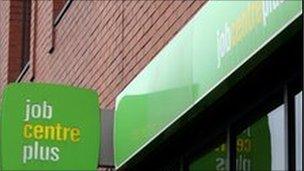Scottish unemployment rate falls
- Published

The fall in Scotland's headline count contrasts with the UK as a whole which saw unemployment rising
The number of people out of work in Scotland has fallen, in contrast with the UK picture where the jobless figure increased.
Official figures found that 216,000 people were jobless between October and December - down 13,000 on the previous survey but up 10,000 over the year.
However, the number of people claiming unemployment benefit in January was up by 1,400 to 139,700.
That was the fourth month of rises but the total shifted little over the year.
The claimant count was up by 700 since January 2010.
One in 20 people in the workforce was on Jobseekers' Allowance.
The fall in Scotland's headline count contrasts with the UK as a whole, which saw unemployment rising, and a steep increase in the number of people taking part-time work when they would prefer a full-time job.
However, the Scottish unemployment rate, at 8%, remains above the UK level, at 7.9%.
Among other findings of the rolling survey by the Official of National Statistics (ONS), the number of people who have jobs in Scotland rose in the October to December period.
At 71%, the employment rate - of those of adult working age - is slightly above the UK figure.
Female employment levels were rising, to 68% of the adult working age population, but male employment levels were falling to 74%.
Scottish economy minister Jim Mather claimed the figures showed the Scottish government's policies were making a real difference.
He said: "For three consecutive monthly labour market statistics releases, we have seen falling unemployment and rising employment in Scotland compared to rising unemployment and falling employment across the UK.
"Scotland's total employment rate is at its highest level since the three months to December 2009 - and Scotland has a higher employment rate and lower economic inactivity rate than the UK as a whole.
"Today's figures show Scotland is the only UK nation with rising employment and falling unemployment over the quarter".
Michael Moore, the Scotland Secretary in the UK Government, said: "The final quarter of 2010 has seen falling unemployment and rising employment in Scotland and I welcome the news that more Scots were in work.
"However, these numbers demonstrate this government must to do all it can to overcome the effects of the irresponsible economic policy we inherited less than a year ago.
"The increase in the number of people claiming Jobseekers Allowance in January shows the government has to work hard throughout this parliament to create the conditions that enable all businesses to thrive and create more sustainable jobs."
Public sector
Scottish Labour leader Iain Gray said the SNP were not doing enough to tackle the crisis in youth unemployment, which rose 3,100 in December.
Mr Gray said: "A generation of young Scots are betrayed and in his recent budget Finance Secretary John Swinney didn't take the immediate, urgent action that was needed.
"It was the usual timid half measures from the SNP letting down our young people when they needed people to stand up for them."
Scottish Conservative finance spokesman Derek Brownlee said there was a pressing need for the Scottish and UK governments to help the private sector create new jobs.
He said: "Scotland has relied too heavily on public sector employment in the past and it is time to focus on helping entrepreneurs build new businesses, and on supporting existing small businesses."
STUC general secretary Grahame Smith said: "Any fall in unemployment is to be welcomed but the entirety of the statistics does not provide any cause for celebration.
"The claimant-count continues to rise, long-term unemployment is increasing on a number of measures and employment remains far below pre-recession levels.
"Jobs growth is being driven by the increase in part-time work and today's figures again show a steep rise in involuntary part-time working."
Liz Cameron, chief Executive of Scottish Chambers of Commerce, said: "This is another welcome sign that the Scottish economy is recovering and that our unemployment rate is falling back towards the UK average.
"One note of caution is that the Scottish economic cycle still appears to be lagging against the UK, and we are yet to feel the full effects of public sector cuts north of the border.
"This means that we are yet to face some serious economic challenges over the course of 2011."
- Published16 February 2011
- Published19 January 2011
- Published29 December 2010